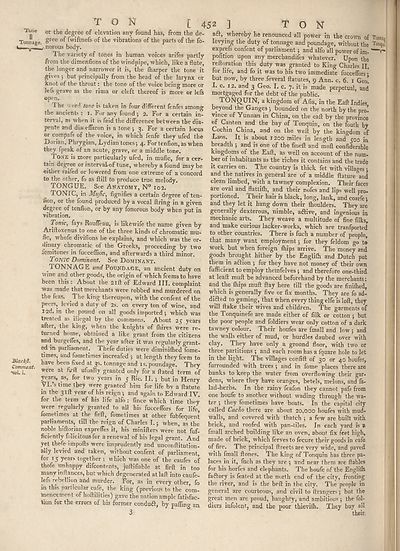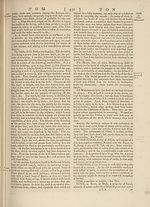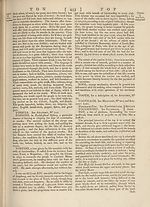Encyclopaedia Britannica, or, a Dictionary of arts, sciences, and miscellaneous literature : enlarged and improved. Illustrated with nearly six hundred engravings > Volume 20, SUI-ZYM
(502) Page 452
Download files
Complete book:
Individual page:
Thumbnail gallery: Grid view | List view

f ON [ 452 ] TON
lone or t}ie degree 0f elevation any found has, from the de-
Tonnage. Sree ^vviftnefs °f the vibrations of the parts of the fo-
»■ > ■ norous body.
The variety of tones in human voices arifes partly
from the dimenfions of the windpipe, which, like a flute,
the longer and narrower it is, the (harper the tone it
gives 5 but principally from the head of the larynx or
knot of the throat: the tone of the voice being more or
lefs grave as the rima or cleft thereof is more or lefs
open.
The word tone is taken in four different fenfes among
the ancients : 1. For any found; 2. For a certain in¬
terval, as when it is faid the difference between the dia-
pente and dia effaron is a tone ; 3. For a certain locus
or compafs of the voice, in which fenfe they ufed the
Dorian, Phrygian, Lydian tones; 4. For tenfion, as when
they fpeak of an acute, grave, or a middle tone.
Tone is more particularly ufed, in mufic, for a cer¬
tain degree or intervahof tune, whereby a found may be
either raifed or lowered from one extreme of a concord
to the other, fo as dill to produce true melody.
TONGUE. See Anatomy, N° 102.
TONIC, in Mnjic, fignifies a certain degree of ten-
fion, or the found produced by a vocal firing in a given
degree of tenfion, or by any fonorous body when put in
vibration.
'Ionic^ fays Rouffeau, is likewife the name given by
Ariftoxenus to one of the three kinds of chromatic mu¬
fic, whofe divifions he explains, and which was the or¬
dinary chromatic of the Greeks, proceeding by two
iemitones in fucceflion, and afterwards a third minor.
Tonic Dominant. See Dominant.
TONNAGE gW Poundage, an ancient duty on
wine and other goods, the origin of which feems to have
been this : About the 2l(I of Edward III. complaint
was made that merchants were robbed and murdered on
the feas. The king thereupon, with the confent of the
peers, levied a duty of 2s. on every ton of wine, and
22d. in the pound on all goods imported ; which was
treated as illegal by the commons. About 25 years
after, the king, when the knights of (hires were re¬
turned home, obtained a like grant from the citizens
and burgeffes, and the year after it was regularly grant¬
ed in parliament. I hefe duties were diminifhed fome-
times, and fometimes increafed ; at length they feem to
fomment. haVe beCn fixed at ^ tonnage and ls- poundage. They
'toL i. were at ufually granted only for a dated term of
years, as, for two years in 5 Ric. II. ; but in Henry
yi,Ts time they were granted him for life by a flatute
in the 3lfl year of his reign ; and again to Edward IV.
for the term of his life alfo : fince which time they
were regularly granted to all his fucceffors for life,
fometimes at the firfl, fometimes at other fubfequent
parliaments, till the reign of Charles I.; when, as the
noble hidorian expreffes it, his miniders were not fuf-
ficiently felicitous for a renewal of his legal grant. And
yet thefe impods were imprudently and unconditution-
ally levied and taken, without confent of parliament,
for 15 years together ; which was one of the caufes of
thofe unhappy difeontents, judifiable at fird in too
many indances, but which degenerated at lad into caufe-
lefs rebellion and murder. For, as in every other, fo
In this particular cafe, the king (previous to the com¬
mencement of hodilities) gave the nation ample fatisfac-
lion for the errors of his former conduft, by paffing an
aft, whereby he renounced all power in the crown of W
levying the duty of tonnage and poundage, without the T<«iui
exprefs confent of parliament; and alfo all power of itn- *—^
pofition upon any merchandifes whatever. Upon the
redoration this duty was granted to King Charles II.
for life, and fo it was to his two immediate fucceffors *
but now, by three Several datutes, 9 Ann. c. 6. 1 Geo!
I. c. 12. and 3 Geo. I. c. 7. it is made perpetual, and
mortgaged for the debt of the public.
TONQUIN, a kingdom of Ada, in the Ead Indies
beyond the Ganges ; bounded on the north by the pro!
vince of Yunnan in China, on the ead by the province
of Canton and the bay of Tonquin, on the fouth by
Cochin China, and on the wed by the kingdom of
Laos. It is about 1200 miles in length and 500 in
breadth ; and is one of the fined and mod confiderable
kingdoms of the Ead, as well on account of the num¬
ber of inhabitants as the riches it contains and the trade
it carries on. The country is thick fet with villages ;
and the natives in general are of a middle dature^and
clean limbed, with a tawney complexion. Their faces
are oval and flattidi, and their nofes and lips well pro¬
portioned. Their hair is black, long, lank, and coarfe;
and they let it hang dowm their flioulders. They are
generally dexterous, nimble, aflive, and ingenious in
mechanic arts. They weave a multitude of fine filks,
and make curious lacker-works, which are tranfported
to other countries. There is fuch a number of people,
that many want employment; for they feldom go t»
wrork but when foreign (hips arrive. The money and
goods brought hither by the Englifh and Dutch put
them in atiion ; for they have not money of their own
fufficient to employ themfelves; and therefore one-third
at lead mud be advanced beforehand by the merchants:
and the (hips mud day here till the goods are finilhed,
which is generally five or fix months. They are fo ad¬
dicted to gaming, that when every thing elfe is lod, they
will dake their wives and children. The garments of
the Tonquinefe are made either of filk or cotton ; but
the poor people and foldiers wear only cotton of a dark
tawney colour. Their houfes are fmall and low ; and
the walls either of mud, or hurdles daubed over with
clay. They have only a ground floor, with two or
three partitions ; and each room has a fquare hole to let
in the light. The villages confid of 30 or 40 houfes,
furrounded wfith trees ; and in fome places there are
banks to keep the water from overflowing their gar¬
dens, where they have oranges, betels, melons, and fa-
lad-herbs. In the rainy feafon they cannot pafs from
one houfe to another without wading through the wa¬
ter ; they fometimes have boats. In the capita] city
called Cac/10 there are about 20,000 houfes with mud-
walls, and covered with thatch ; a few are built with
brick, and roofed with pan-tiles. In each yard is s
fmall arched building like an oven, about fix feet high,
made of brick, which ferves to fecure their goods in cafe
of fire. The principal dreets are very vfide, and paved
with fmall dones. The king of Tonquin has three pa¬
laces in it, fuch as they are ; and near them are dables
for his horfes and elephants. The houfe of the Englilh
factory is feated at the north end of the city, fronting
the river, and is the bed in the city. The people in
general are courteous, and civil to drangers; but the
great men are proud, haughty, and ambitious ; the fol-
diers infolent, and the poor thievifli. They buy all
their
lone or t}ie degree 0f elevation any found has, from the de-
Tonnage. Sree ^vviftnefs °f the vibrations of the parts of the fo-
»■ > ■ norous body.
The variety of tones in human voices arifes partly
from the dimenfions of the windpipe, which, like a flute,
the longer and narrower it is, the (harper the tone it
gives 5 but principally from the head of the larynx or
knot of the throat: the tone of the voice being more or
lefs grave as the rima or cleft thereof is more or lefs
open.
The word tone is taken in four different fenfes among
the ancients : 1. For any found; 2. For a certain in¬
terval, as when it is faid the difference between the dia-
pente and dia effaron is a tone ; 3. For a certain locus
or compafs of the voice, in which fenfe they ufed the
Dorian, Phrygian, Lydian tones; 4. For tenfion, as when
they fpeak of an acute, grave, or a middle tone.
Tone is more particularly ufed, in mufic, for a cer¬
tain degree or intervahof tune, whereby a found may be
either raifed or lowered from one extreme of a concord
to the other, fo as dill to produce true melody.
TONGUE. See Anatomy, N° 102.
TONIC, in Mnjic, fignifies a certain degree of ten-
fion, or the found produced by a vocal firing in a given
degree of tenfion, or by any fonorous body when put in
vibration.
'Ionic^ fays Rouffeau, is likewife the name given by
Ariftoxenus to one of the three kinds of chromatic mu¬
fic, whofe divifions he explains, and which was the or¬
dinary chromatic of the Greeks, proceeding by two
iemitones in fucceflion, and afterwards a third minor.
Tonic Dominant. See Dominant.
TONNAGE gW Poundage, an ancient duty on
wine and other goods, the origin of which feems to have
been this : About the 2l(I of Edward III. complaint
was made that merchants were robbed and murdered on
the feas. The king thereupon, with the confent of the
peers, levied a duty of 2s. on every ton of wine, and
22d. in the pound on all goods imported ; which was
treated as illegal by the commons. About 25 years
after, the king, when the knights of (hires were re¬
turned home, obtained a like grant from the citizens
and burgeffes, and the year after it was regularly grant¬
ed in parliament. I hefe duties were diminifhed fome-
times, and fometimes increafed ; at length they feem to
fomment. haVe beCn fixed at ^ tonnage and ls- poundage. They
'toL i. were at ufually granted only for a dated term of
years, as, for two years in 5 Ric. II. ; but in Henry
yi,Ts time they were granted him for life by a flatute
in the 3lfl year of his reign ; and again to Edward IV.
for the term of his life alfo : fince which time they
were regularly granted to all his fucceffors for life,
fometimes at the firfl, fometimes at other fubfequent
parliaments, till the reign of Charles I.; when, as the
noble hidorian expreffes it, his miniders were not fuf-
ficiently felicitous for a renewal of his legal grant. And
yet thefe impods were imprudently and unconditution-
ally levied and taken, without confent of parliament,
for 15 years together ; which was one of the caufes of
thofe unhappy difeontents, judifiable at fird in too
many indances, but which degenerated at lad into caufe-
lefs rebellion and murder. For, as in every other, fo
In this particular cafe, the king (previous to the com¬
mencement of hodilities) gave the nation ample fatisfac-
lion for the errors of his former conduft, by paffing an
aft, whereby he renounced all power in the crown of W
levying the duty of tonnage and poundage, without the T<«iui
exprefs confent of parliament; and alfo all power of itn- *—^
pofition upon any merchandifes whatever. Upon the
redoration this duty was granted to King Charles II.
for life, and fo it was to his two immediate fucceffors *
but now, by three Several datutes, 9 Ann. c. 6. 1 Geo!
I. c. 12. and 3 Geo. I. c. 7. it is made perpetual, and
mortgaged for the debt of the public.
TONQUIN, a kingdom of Ada, in the Ead Indies
beyond the Ganges ; bounded on the north by the pro!
vince of Yunnan in China, on the ead by the province
of Canton and the bay of Tonquin, on the fouth by
Cochin China, and on the wed by the kingdom of
Laos. It is about 1200 miles in length and 500 in
breadth ; and is one of the fined and mod confiderable
kingdoms of the Ead, as well on account of the num¬
ber of inhabitants as the riches it contains and the trade
it carries on. The country is thick fet with villages ;
and the natives in general are of a middle dature^and
clean limbed, with a tawney complexion. Their faces
are oval and flattidi, and their nofes and lips well pro¬
portioned. Their hair is black, long, lank, and coarfe;
and they let it hang dowm their flioulders. They are
generally dexterous, nimble, aflive, and ingenious in
mechanic arts. They weave a multitude of fine filks,
and make curious lacker-works, which are tranfported
to other countries. There is fuch a number of people,
that many want employment; for they feldom go t»
wrork but when foreign (hips arrive. The money and
goods brought hither by the Englifh and Dutch put
them in atiion ; for they have not money of their own
fufficient to employ themfelves; and therefore one-third
at lead mud be advanced beforehand by the merchants:
and the (hips mud day here till the goods are finilhed,
which is generally five or fix months. They are fo ad¬
dicted to gaming, that when every thing elfe is lod, they
will dake their wives and children. The garments of
the Tonquinefe are made either of filk or cotton ; but
the poor people and foldiers wear only cotton of a dark
tawney colour. Their houfes are fmall and low ; and
the walls either of mud, or hurdles daubed over with
clay. They have only a ground floor, with two or
three partitions ; and each room has a fquare hole to let
in the light. The villages confid of 30 or 40 houfes,
furrounded wfith trees ; and in fome places there are
banks to keep the water from overflowing their gar¬
dens, where they have oranges, betels, melons, and fa-
lad-herbs. In the rainy feafon they cannot pafs from
one houfe to another without wading through the wa¬
ter ; they fometimes have boats. In the capita] city
called Cac/10 there are about 20,000 houfes with mud-
walls, and covered with thatch ; a few are built with
brick, and roofed with pan-tiles. In each yard is s
fmall arched building like an oven, about fix feet high,
made of brick, which ferves to fecure their goods in cafe
of fire. The principal dreets are very vfide, and paved
with fmall dones. The king of Tonquin has three pa¬
laces in it, fuch as they are ; and near them are dables
for his horfes and elephants. The houfe of the Englilh
factory is feated at the north end of the city, fronting
the river, and is the bed in the city. The people in
general are courteous, and civil to drangers; but the
great men are proud, haughty, and ambitious ; the fol-
diers infolent, and the poor thievifli. They buy all
their
Set display mode to:
![]() Universal Viewer |
Universal Viewer | ![]() Mirador |
Large image | Transcription
Mirador |
Large image | Transcription
Images and transcriptions on this page, including medium image downloads, may be used under the Creative Commons Attribution 4.0 International Licence unless otherwise stated. ![]()
| Permanent URL | https://digital.nls.uk/192281073 |
|---|
| Description | Plates 516, 519 and 520 missing. |
|---|---|
| Attribution and copyright: |
|
| Description | Ten editions of 'Encyclopaedia Britannica', issued from 1768-1903, in 231 volumes. Originally issued in 100 weekly parts (3 volumes) between 1768 and 1771 by publishers: Colin Macfarquhar and Andrew Bell (Edinburgh); editor: William Smellie: engraver: Andrew Bell. Expanded editions in the 19th century featured more volumes and contributions from leading experts in their fields. Managed and published in Edinburgh up to the 9th edition (25 volumes, from 1875-1889); the 10th edition (1902-1903) re-issued the 9th edition, with 11 supplementary volumes. |
|---|---|
| Additional NLS resources: |
|

